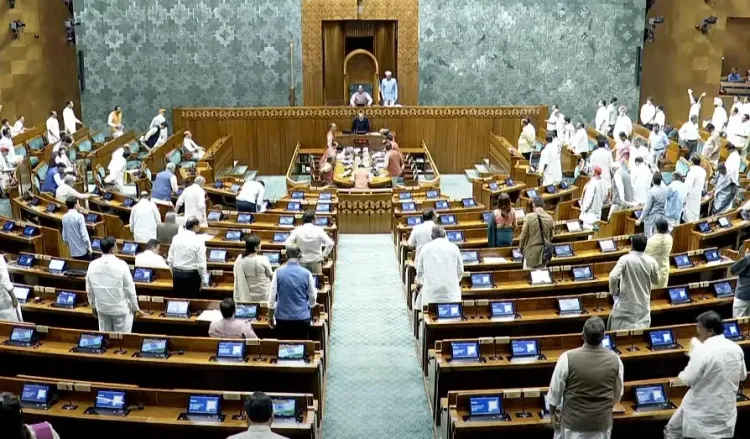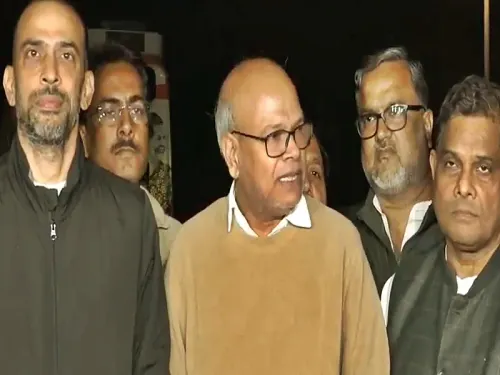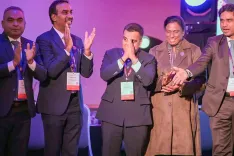What Happened with the Mines Amendment Bill?

Synopsis
Key Takeaways
- Legislation enhances transparency in mining.
- Establishment of trading exchanges for minerals.
- Expansion of the National Mineral Exploration Trust.
- Potential for increased state revenues and employment.
- Continued political tensions over electoral issues.
New Delhi, Aug 12 (NationPress) The Lok Sabha approved the Mines and Minerals (Development and Regulation) Amendment Bill, 2025 via a voice vote on Tuesday, amidst ongoing protests from Opposition members regarding the Special Intensive Revision (SIR) of the voter list in Bihar.
This Bill, introduced by Union Minister for Mines G. Kishan Reddy, aims to transform India's mining framework to enhance transparency, stimulate domestic production, and secure essential mineral supply chains.
As the House reconvened at 4:30 p.m., protests erupted again, with Opposition MPs chanting slogans from the Well, insisting on a discussion about the SIR exercise.
During the session, Jagdambika Pal urged members to take their seats, reminding them that the Supreme Court had reaffirmed the Election Commission's position and that the issue was currently under judicial consideration. He questioned, “Why are you coming to the Well before the House Well?” as papers were hurled toward the Chair.
Parliamentary Affairs Minister Kiren Rijiju condemned the Opposition's actions, stating he had never seen such conduct in his life.
The Chair reprimanded the Opposition members, specifically mentioning Gaurav Gogoi, accusing him of inciting his colleagues to throw paper.
Despite the disorder, the Bill was debated. Minister Reddy asserted that the legislation would ensure royalty benefits for states, promote exploration of deep minerals, and modernize the sector through technological advancements. He pointed out that the Bill aligns with India’s National Critical Mineral Mission and aims to lessen dependency on imports of strategic resources like lithium, cobalt, and rare earths.
A notable feature of the Bill is the establishment of mineral and metal trading exchanges—electronic platforms facilitating real-time trading of minerals and processed metals. These exchanges are anticipated to foster transparency, reduce cartelization, and attract investment in mining infrastructure.
The Bill also proposes a rebranding and expansion of the National Mineral Exploration Trust (NMET), which will be renamed the National Mineral Exploration and Development Trust (NMEDT), granting it the authority to invest in overseas acquisitions of critical mineral blocks.
During the discussion, several MPs voiced their support for the Bill. Malvika Devi (BJP, Kalahandi), G. Laxminarayan (TDP, Anantapuram), Gurumoorthy Maddila (YSRCP, Tirupati), Brijmohan Agrawal (BJP, Raipur), and Sangeeta Kumari Singh Deo (BJP, Bolangir) emphasized the Bill's potential to create jobs, increase state revenues, and bolster India’s strategic independence in mineral sourcing.
In response to the interruptions, Jagdambika Pal pointedly asked, “Do you oppose financial benefits for the states? What is your objection?”
His appeals, however, were overshadowed by ongoing slogans and paper-throwing from the Opposition.
This Bill represents a critical update to the Mines and Minerals (Development and Regulation) Act of 1957, with prior amendments made in 2015 and 2021. It introduces simplified licensing procedures, expands territorial scope for exploration, and establishes mechanisms for dispute resolution.
Additionally, Finance Minister Nirmala Sitharaman sought permission to introduce a Bill further amending the Insolvency and Bankruptcy Code, 2016.
She also requested that the Bill be sent to a Select Committee of the House, to which the Chair addressed the protesting Opposition members, “Did you hear what the finance minister mentioned? Will you oppose the Bill being forwarded to the select committee?”
Nonetheless, the Opposition continued to chant.
The Speaker will determine the members of the committee and the conditions regarding the panel.
The Committee is expected to submit its report by the first day of the next session.
Following the successful passage of the Mines and Minerals Amendment Bill, the Chair adjourned the House until Monday, August 18, as the Monsoon Session remains plagued by persistent disruptions concerning electoral transparency and procedural demands.









